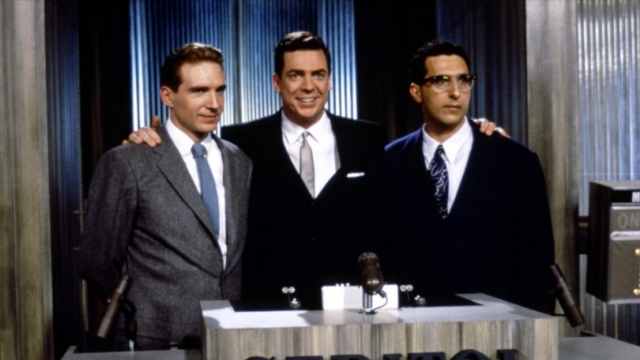When Robert Redford’s Quiz Show was released in 1994, it was interpreted as (among other things) an elegy for a lost era in which intelligence (and public intellectuals) were celebrated on television. The film tells the true story of the game show Twenty-One and the scandal that erupted when it came out that producers were feeding answers to popular contestants in order to drive ratings. Making that claim is the obnoxious (and Jewish) Herb Stempel (John Turturro); according to his story, producers instructed him to take a dive, easing the way for WASPy, telegenic Columbia professor Charles Van Doren (Ralph Fiennes). Caught in the middle is congressional investigator Dick Goodwin (Rob Morrow), who is drawn into Van Doren’s circle and that of his famous family (Charles being the son of poet and scholar Mark Van Doren).
Roger Ebert, in his glowing review, observed that
[the] early quiz shows rewarded knowledge, and made celebrities out of people who knew a lot of things and could remember them. The post-fix quiz shows rewarded luck. On The $64,000 Question and Twenty-One you could see people getting rich because they were smart. Today people on TV make money by playing games a clever child can master. The message is that it’s not necessary to know anything, because you can be ignorant and still get lucky.
On the one hand, it would be easy to point to game shows like Deal or No Deal as an example of “games a clever child can master;” in that light the film’s condemnation of show business cynicism and the dumbing down of American culture is as relevant as ever. On the other, the fact that someone like Ken Jennings could become a niche celebrity after his winning streak on Jeopardy! shows that smarts can still draw a crowd. (It’s worth noting, however, that Jennings’ post-Jeopardy! success owes as much to his accessible public persona as to his deep knowledge of trivia, something the producers of Twenty-One would have appreciated.)
Even more than the changes in programming, Quiz Show examines (and indicts) the moment when the television became the central item of furniture in the American home. It’s safe to say that, pre-television, most American families weren’t engaging in Shakespeare quote-offs, as the Van Dorens are shown doing at a picnic, but there was nevertheless an anxiety about the new technology that monopolized family rooms and family time (illustrated by Mark Van Doren’s bemusement at the television Charles buys him in the film).
Temptation is a major theme of the film, and Redford doesn’t make Goodwin’s choice easy: upwardly mobile and Jewish but assimilated, Goodwin sees much of himself in Stempel, specifically the part he would like to leave behind. For a while, Goodwin has only Stempel’s word that he was fed the answers, and it’s easy to write him off as a disgruntled loser. As Van Doren, Fiennes is so charming and likeable that it’s not only easy to believe him: Goodwin wants to believe him, to let him off the hook.
The movie also looks squarely at Van Doren’s choices: the audience is along to watch him squirm as the noose tightens, as what at first seemed like the easy choice ends up destroying his career. Most painful are the scenes between Charles and Mark (Paul Scofield), whose pride (and slight bewilderment) in his son’s achievements give way to disgust and shame. Quiz Show suggests that even the man who seemingly has everything can be tempted to take the easy way through a sense of expediency or entitlement.

